Related Research Articles

Commodus was a Roman emperor who ruled from 177 to 192. He served jointly with his father Marcus Aurelius from 177 until the latter's death in 180, and thereafter he reigned alone until his assassination. His reign is commonly thought to mark the end of a golden age of peace and prosperity in the history of the Roman Empire.

Publius Helvius Pertinax was Roman emperor for the first three months of 193. He succeeded Commodus to become the first emperor during the tumultuous Year of the Five Emperors.

Marcus Didius Julianus was Roman emperor from March to June 193, during the Year of the Five Emperors. Julianus had a promising political career, governing several provinces, including Dalmatia and Germania Inferior, and defeated the Chauci and Chatti, two invading Germanic tribes. He was even appointed to the consulship in 175 along with Pertinax as a reward, before being demoted by Commodus. After this demotion, his early, promising political career languished.
Sextus Julius Frontinus was a prominent Roman civil engineer, author, soldier and senator of the late 1st century AD. He was a successful general under Domitian, commanding forces in Roman Britain, and on the Rhine and Danube frontiers. A novus homo, he was consul three times. Frontinus ably discharged several important administrative duties for Nerva and Trajan. However, he is best known to the post-Classical world as an author of technical treatises, especially De aquaeductu, dealing with the aqueducts of Rome.
The gens Sulpicia was one of the most ancient patrician families at ancient Rome, and produced a succession of distinguished men, from the foundation of the Republic to the imperial period. The first member of the gens who obtained the consulship was Servius Sulpicius Camerinus Cornutus, in 500 BC, only nine years after the expulsion of the Tarquins, and the last of the name who appears on the consular list was Sextus Sulpicius Tertullus in AD 158. Although originally patrician, the family also possessed plebeian members, some of whom may have been descended from freedmen of the gens.
Quintus Pompeius Falco was a Roman senator and general of the early 2nd century AD. He was governor of several provinces, most notably Roman Britain, where he hosted a visit to the province by the Emperor Hadrian in the last year. Falco achieved the rank of suffect consul for the nundinium of September to December 108 with Marcus Titius Lustricus Bruttianus as his colleague.

The gens Pompeia was a plebeian family at ancient Rome, first appearing in history during the second century BC, and frequently occupying the highest offices of the Roman state from then until imperial times. The first of the Pompeii to obtain the consulship was Quintus Pompeius in 141 BC, but by far the most illustrious of the gens was Gnaeus Pompeius, surnamed Magnus, a distinguished general under the dictator Sulla, who became a member of the First Triumvirate, together with Caesar and Crassus. After the death of Crassus, the rivalry between Caesar and Pompeius led to the Civil War, one of the defining events of the final years of the Roman Republic.
Quintus Sosius Senecio was a Roman senator who was favored by the emperors Domitian and Trajan. As a result of this relationship, he was twice ordinary consul, an unusual and prestigious honor: first in 99, with Aulus Cornelius Palma Frontonianus as his colleague; and again in 107 as the colleague of Lucius Licinius Sura, who was himself consul for the third time.
The gens Servilia was a patrician family at ancient Rome. The gens was celebrated during the early ages of the Republic, and the names of few gentes appear more frequently at this period in the consular Fasti. It continued to produce men of influence in the state down to the latest times of the Republic, and even in the imperial period. The first member of the gens who obtained the consulship was Publius Servilius Priscus Structus in 495 BC, and the last of the name who appears in the consular Fasti is Quintus Servilius Silanus, in AD 189, thus occupying a prominent position in the Roman state for nearly seven hundred years.
Gaius Julius Erucius Clarus Vibianus was a Roman politician and senator. He was consul ordinarius with Quintus Pompeius Sosius Falco in early 193, during the reign of Pertinax.
Quintus Pompeius Senecio Sosius Priscus was a Roman senator who was appointed consul during the reign of Marcus Aurelius.

The gens Sosia, occasionally written Sossia, was a plebeian family at ancient Rome. Members of this gens occur in history from the end of the Republic down to the third century AD. The first of the Sosii to attain the consulship was Gaius Sosius in 32 BC, and the family would continue holding various positions in the Roman state until the third century.
Senecio Memmius Afer was a Roman senator active in the last quarter of the first century AD. He was suffect consul for the nundinium of June to July AD 99 as the colleague of Publius Sulpicius Lucretius Barba. Afer is known primarily from inscriptions.
Marcus Pontius Laelianus Larcius Sabinus was a Roman senator and general who held a series of offices in the emperor's service. He was suffect consul for the nundinium of July-August 145 as the colleague of Quintus Mustius Priscus. Laelianus is primarily known through inscriptions.
Quintus Pompeius Sosius Priscus was a Roman senator active in the mid-second century AD, who held a number of offices in the emperor's service. Priscus served as ordinary consul for the year 149 as the colleague of Lucius Sergius Salvidienus Scipio Orfitus. His life is known entirely from inscriptions.
The gens Roscia, probably the same as Ruscia, was a plebeian family at ancient Rome. Members of this gens are mentioned as early as the fifth century BC, but after this time they vanish into obscurity until the final century of the Republic. A number of Roscii rose to prominence in imperial times, with some attaining the consulship from the first to the third centuries.
Triarius Maternus, otherwise known as Triarius Maternus Lascivius was a Roman Senator who was consul ordinarius in 185 CE with Atticus Bradua as his colleague.

The gens Triaria was an obscure plebeian family at ancient Rome. Only a few members of this gens are mentioned by Roman writers, but two of them attained the consulship in imperial times. Other Triarii are known from inscriptions.
References
- ↑ Paul M. M. Leunissen, Konsuln und Konsulare in der Zeit von Commodus bis Severus Alexander (Amsterdam: J.C. Gieben, 1989), p. 133
- ↑ Champlin, "Notes on the Heirs of Commodus", American Journal of Philology, 100 (1979), pp. 303f
- ↑ Dio, 72.22.1-2
- ↑ "Perinax", 5.2-3
- ↑ McDermott, "Stemmata quid faciunt? The Descendants of Frontinus", Ancient Society, 7 (1976), pp. 231f
- ↑ Shelagh Jameson, "Two Lycian Families", Anatolian Studies, 16 (1966), p. 128
- ↑ McDermott, "Stemmata quid faciunt?", p. 232
- ↑ Jameson, "Two Lycian Families", p. 127
- ↑ McDermott, "Stemmata quid faciunt?", pp. 230f